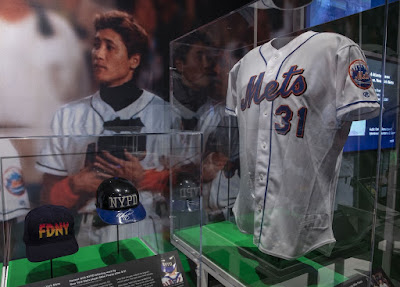The 9/11 Memorial Museum, located at the World Trade Center site, the former location of the Twin Towers that were destroyed during the September 11 attacks, "is operated by a non-profit institution whose mission is to raise funds for, program, and operate the memorial and museum at the World Trade Center site." As further listed on its website: "the 9/11 Memorial Museum serves as the country's principal institution concerned with exploring the implications of the events of 9/11, documenting the impact of those events and exploring 9/11's continuing significance." There is much to learn, hold, revere and appreciate within this sacred space. I know that this museum is not an easy one for many people to visit. However a new exhibit, "Comeback Season: Sports After 9/11" is a significant one for those looking to further their study of Sports and Spirituality.
As written on the Memo Blog
“Comeback Season: Sports After 9/11,” a new special exhibition at the 9/11 Memorial Museum, will open to the public on June 27, 2018. The exhibition explores how sports and athletes helped to unite the country, console a grieving nation and gave us a reason to cheer again following the 2001 attacks.
In the days after 9/11, stadiums sat empty, sports teams could not fly and season schedules were disrupted. With most major sporting events canceled in the immediate aftermath of the terrorist attacks, team and league officials, athletes, coaches, and fans wondered when and how play should resume.
“For so many in the weeks and months following 9/11, sports offered a welcome distraction from the weight of grief, an uplifting experience to share with others and something to cheer about,” 9/11 Memorial & Museum President Alice M. Greenwald said. “Some victims’ family members chose to honor loved ones by celebrating the sports they had loved, as leagues, teams, athletes, and fans came together to affirm that what we have in common is far greater than what divides us.”
“Comeback Season” will illustrate many iconic moments — such as former President George W. Bush’s first pitch during a World Series game at Yankee Stadium and the New York Mets’ Mike Piazza’s dramatic, two-run home run during the first professional baseball game in New York City after 9/11 — as well as previously untold stories that highlight the unifying force of sports in American life.
The exhibition will showcase artifacts and stories related to sports already in season on Sept. 11, 2001, as well as many sports and events in the months to follow, including baseball, football, hockey, NASCAR, soccer, the New York City Marathon and the 2002 Winter Olympics.
We have much to celebrate on July 4. And yet, I believe in order to celebrate, we must remember. This 9/11 Memorial Museum and its exhibits help us to do that through the preservation of architecture, the usage of space, mementos, memorials, symbols, art and much more. I'm grateful that sports and spirituality are a valuable part of it.
God Bless America.
Photo Credits
Mets gear
Father and Son
W Strike





No comments:
Post a Comment